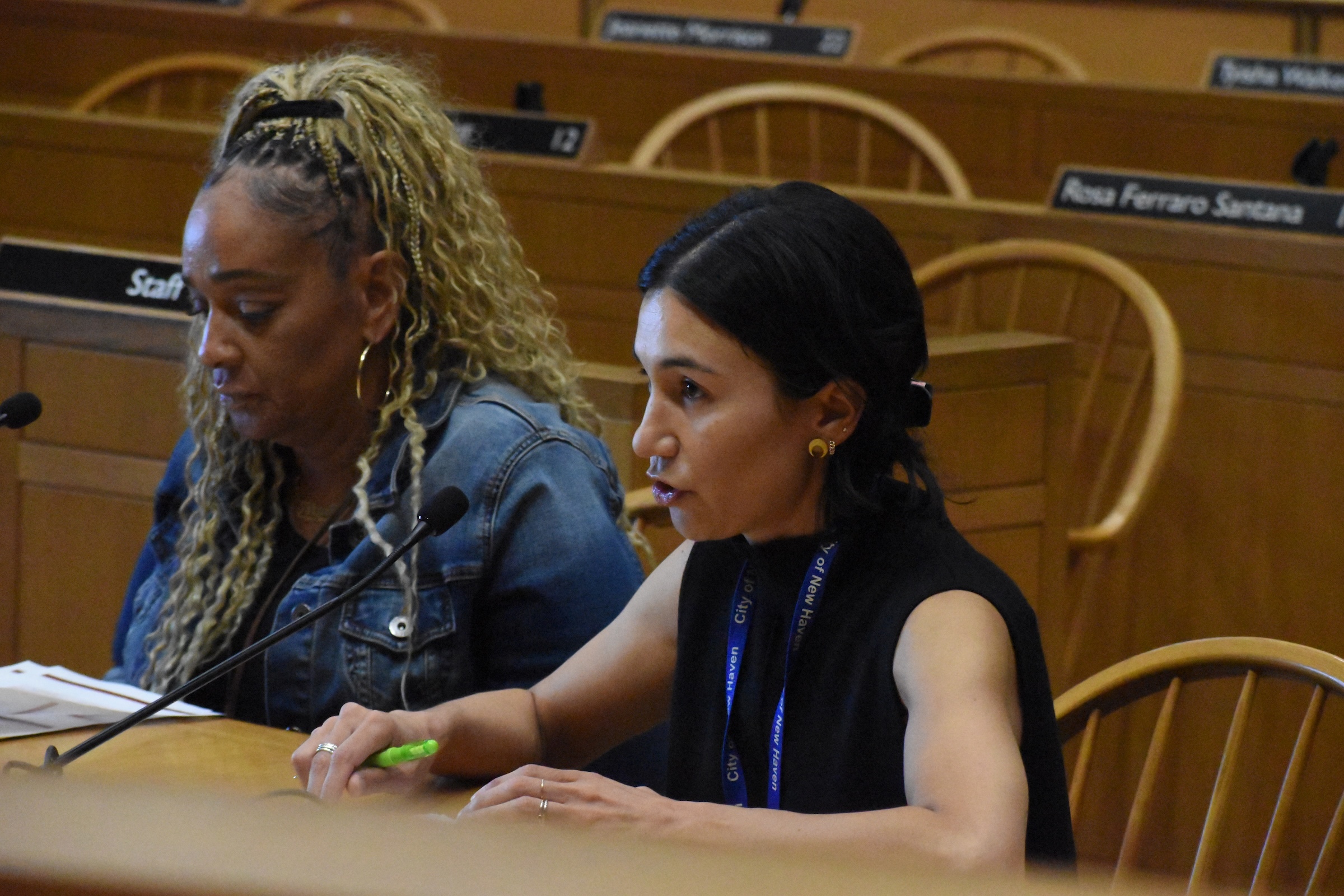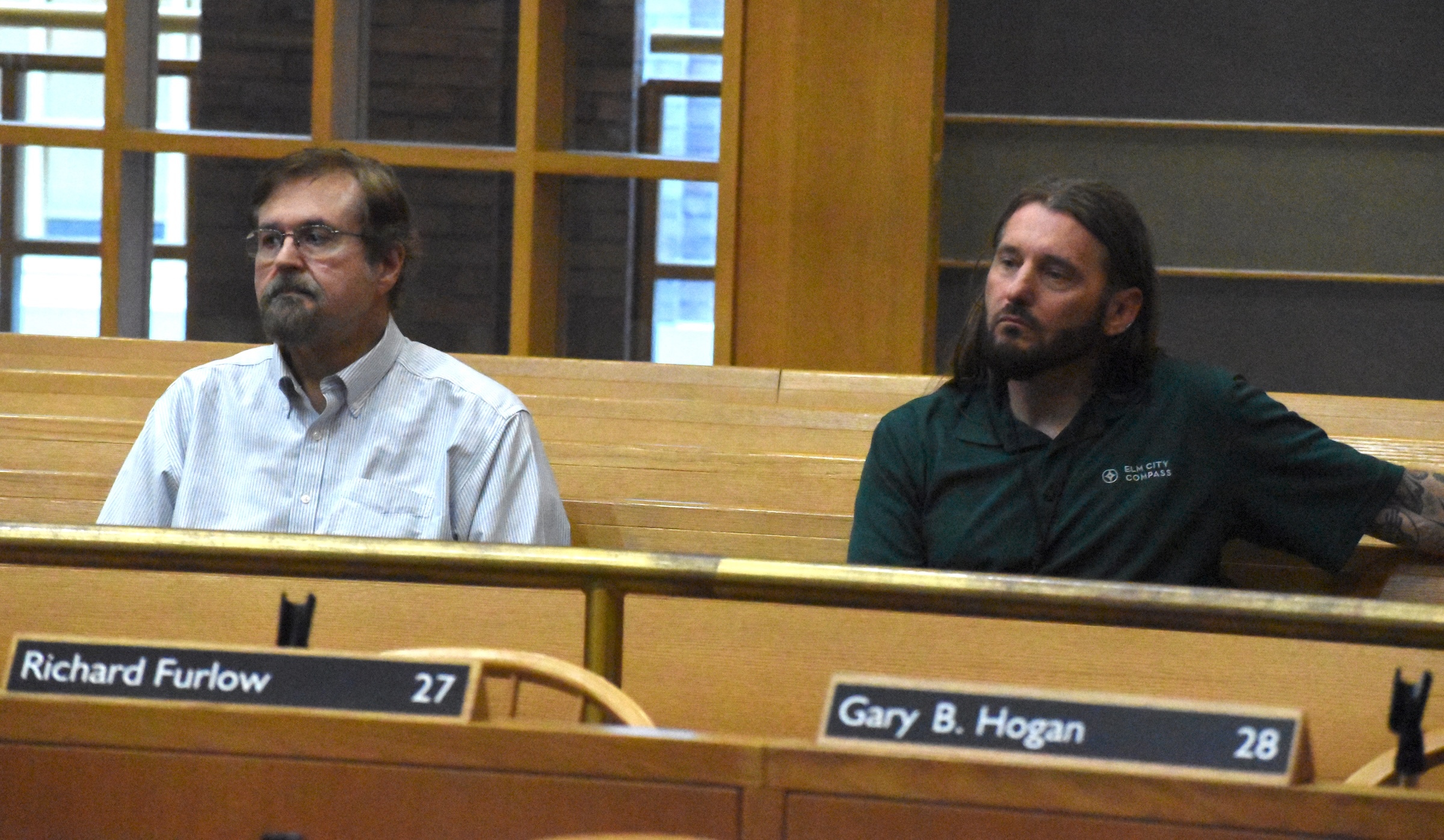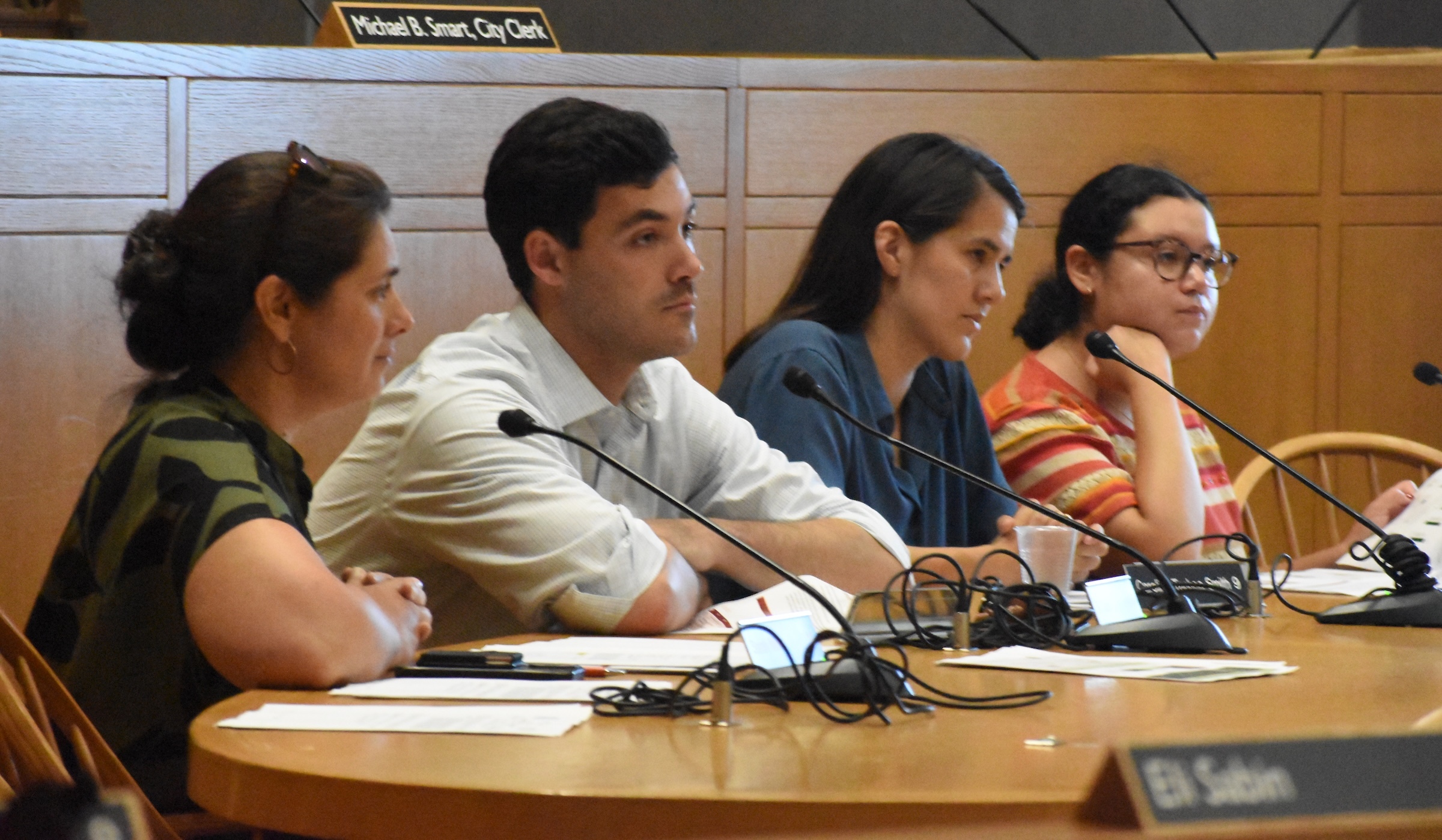
Nora Grace-Flood File Photo
COMPASS outreach worker Famatta Gibson connected Ronnie to emergency shelter two summers ago, during a state crackdown against sleeping in Union Station.

Laura Glesby photo
Department of Community Resilience Director Tirzah Kemp and Community Mental Health Initiatives Coordinator Lorena Mitchell pitch alders on graduating COMPASS from its pilot phase.
The city’s non-police crisis response team is one step closer to becoming a permanent program after a three-year pilot phase reaches its conclusion, thanks to a vote taken Thursday night at City Hall.
The Board of Alders Health and Human Services committee voted unanimously to advance a new million-dollar contract that would enable the Elm City COMPASS (Compassionate Allies Serving our Streets) crisis response team to continue operating.
The city partnered with Yale University to launch COMPASS in 2022 as part of an effort to divert mental health, substance use, and homelessness-related 911 calls from police and fire responders. The program’s crisis response team members work in pairs, typically comprising one mental health clinician and one supporter with shared lived experience. After a phased rollout, the teams now work in shifts covering 8 a.m. to 3 a.m., seven days a week.
In addition to the crisis response team, COMPASS works to coordinate city and nonprofit resources for individuals in a mental health or substance use crisis, including by connecting people to Continuum of Care’s 23-hour crisis beds. The program has a community advisory board and a data analysis component as well. The city has already extended a contract with Yale, covering those aspects of the program through June 2026.
On Thursday, alders were tasked with reviewing a $1.128 million contract covering the crisis response team itself.
The new contract would take effect on Aug. 15 and last through June 30, 2026. It would retain the scale and scope of services that COMPASS currently offers, while marking the end of the program’s pilot phase.
The most significant change in the new contract is Yale’s absence.
The city had previously contracted with the Consultation Center at Yale, a division of the university’s psychiatry department, to create and steward the pilot program. The Consultation Center, in turn, enlisted the local non-profit Continuum of Care as the subcontractor in charge of COMPASS’ day-to-day crisis response operations.
Under the proposed new contract, the city would hire Continuum of Care directly to operate the crisis response prong of the program.
“The original contract with Yale was only ever going to be three years,” said City Mental Health Initiatives Coordinator Lorena Mitchell. She told the committee alders that she expects communication about budgetary matters to be more efficient without having Yale as an intermediary between the city and Continuum of Care.
“I feel very confident in our relationship with Continuum of Care,” said Mitchell.
Both Mitchell and Department of Community Resilience Director Tirzah Kemp praised the impact that COMPASS director Jack Tebes, a Yale professor, has had on the program so far.
The program ultimately aims to help people in crisis avoid going to jail, the emergency room, or the psychiatric ward when the team can employ other, less restrictive ways of assisting that person, said Continuum of Care’s COMPASS coordinator John Labieniec after the meeting.
“My favorite story,” he said, is when one client had been in the midst of a confrontational interaction with police when COMPASS team members arrived on scene. The client recognized their green shirts, Labieniec recounted, and instantly relaxed at the sight of responders whom he trusted — even saying out loud, “Oh, it’s COMPASS!”, according to Labieniec.
“We see this as a way of preventing 911 calls and preventing escalation,” said Mitchell.
“The diversion piece is huge,” Labieniec said, noting that avoiding incarceration or forced hospitalization when possible can help prevent people from experiencing even more trauma and struggling even more as a result.
Mitchell also presented alders with data about 2,781 “crisis responses” that COMPASS has carried out over the course of nearly three years. According to Mitchell, police or fire responders requested COMPASS’ assistance for 53 percent of those cases. Another 43 percent of those cases came from proactive outreach by COMPASS teams. And 4 percent were non-police responses to 911 calls about loitering that dispatchers determined do not warrant police or medical attention — a system that began its rollout more recently, in 2023.
Mitchell estimated that over the course of two and a half years, COMPASS saved over 25 weeks of police time and over four weeks of fire department time, enabling those departments to allocate their resources elsewhere.
She said that the New Haven Police Department headquarters at 1 Union Ave. is in fact among the more frequent sites where COMPASS teams are called to assist with someone in crisis.
Mitchell noted that the city’s 911 Public Safety Answering Point (PSAP) department will soon be upgrading its software in a way that will incorporate COMPASS as a city response team, along with the fire department and police department.
Fair Haven Alder Sarah Miller asked the presenters about how COMPASS is connected to Familiar Faces, a relatively new city initiative to identify and coordinate resources for individuals who repeatedly need crisis assistance.
According to Kemp, the six-month-old initiative is in an early stage. It’s an effort to increase communication and coordination between city departments and non-profits — including COMPASS — who are interacting with the same person on a regular basis, potentially entailing cross-departmental meetings about specific people using city support services.
“If they’re loitering, panhandling, being a a public nuisance,” said Kemp, “we would prefer to come in and redirect them to supportive services, like mental health treatment and substance use treatment, and divert them from arrest, and so and and so forth.” One goal of Familiar Faces, she said, is to avoid “duplicating services.”
Downtown/East Rock Alder and Committee Chair Eli Sabin asked whether the transition away from Yale’s oversight will leave a gap in supervision or coordination that the city will have to fill.
“The program required more management during the pilot phase,” responded Mitchell. She said that the city and Continuum of Care will need to figure out how to absorb the administrative work that Yale provided in years past. She noted Yale will continue to steward COMPASS’ advisory board, data collection, and resource coordination arms in the coming year, during which Tebes will continue to be involved in running the program — creating an extended transition.
“Are there any conversations about how Yale will continue to be involved?” asked East Rock/Fair Haven Alder Caroline Tanbee Smith.
Kemp responded that those conversations are just beginning.
“How do we make it so Yale has — excuse my language, but has some skin in the game?” she asked. She said that the university benefits from COMPASS, and that the city is exploring how to encourage New Haven’s wealthier institutions to invest in the program as they reap its benefits.
At the end of the 40-minute meeting, the four committee members in attendance — Sabin, Miller, Smith, and Downtown/Yale Alder Kiana Flores — voted to favorably recommend the new contract. Sabin said that he intends to request that the full Board of Alders vote on the item at their next meeting in August, likely in the form of a unanimous consent vote, so that the city can implement the contract by the start date of Aug. 15.

COMPASS leaders Jack Tebes and John Labieniec.

Committee alders unanimously support the contract.